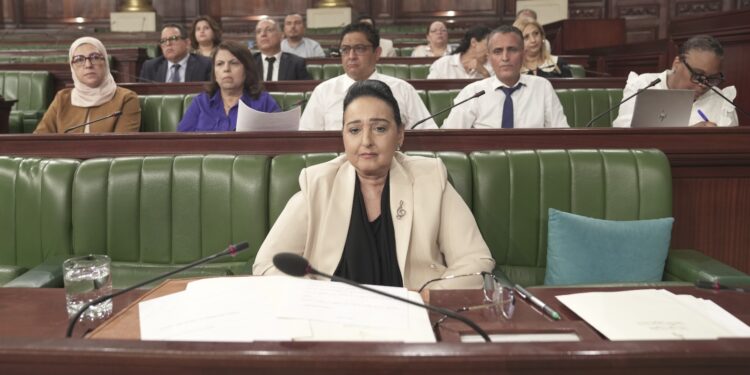Amina Srarfi was auditioned Tuesday, July 29, by deputies during a plenary tense at ARP, marked by questions about the opaque management of public aid, the fate of archaeological heritage and inaction in the face of cultural projects at the end.
A under tension
During a plenary session in the Assembly of Representatives of the People, the Minister of Cultural Affairs Amina Srarfi answered ten questions raised by deputies, mainly around regional disparities in terms of cultural infrastructure, management of festivals, heritage conservation, and above all suspicions of corruption in the allocation of public aid.
Several deputies have denounced the lack of transparency in the distribution of festivals subsidies, with as an example the vine festival in Grombalia, on the budget deemed derisory despite its 66 editions. Investigation and accountability calls have been launched.
In terms of heritage, the situation is deemed alarming: hundreds of threatened archaeological sites, regional representations of the National Institute of Heritage (INP) unstable, and objects discovered in Zama Regia (Siliana) still exhibited in Rome, feed the anger of the elected officials.
Prudent responses from the Minister
Faced with criticism, the Minister tried to reassure by declaring that 98 files are being examined concerning unfinished cultural projects, that 27 others are the subject of internal procedures for the restitution of subsidies, that the management of festivals would be framed by financial audits and technical commissions, and that all corruption files are processed by the general inspection, and could lead to proportional sanctions.
Regarding the project of the National Museum of Prehistoric Civilizations in Gafsa, the Minister recalled its launch in 2016 and spoke of local differences on the site of establishment, which still blocks its realization.
She also indicated that the declining case within the ministry is in the hands of justice.
Mistrust and calls for action
MEPs underlined the gap between official declarations and the reality on the ground. The general feeling is that the ministry struggles to restore confidence, despite a desire for reform.
A culture weakened by centralization and blockages
Tunisia has been suffering for years from a concentration of cultural initiatives in major cities and a lack of resources in the interior regions. To this are added fixed projects, deficient governance and recurrent allegations of embezzlement, which harm the country’s cultural influence.








